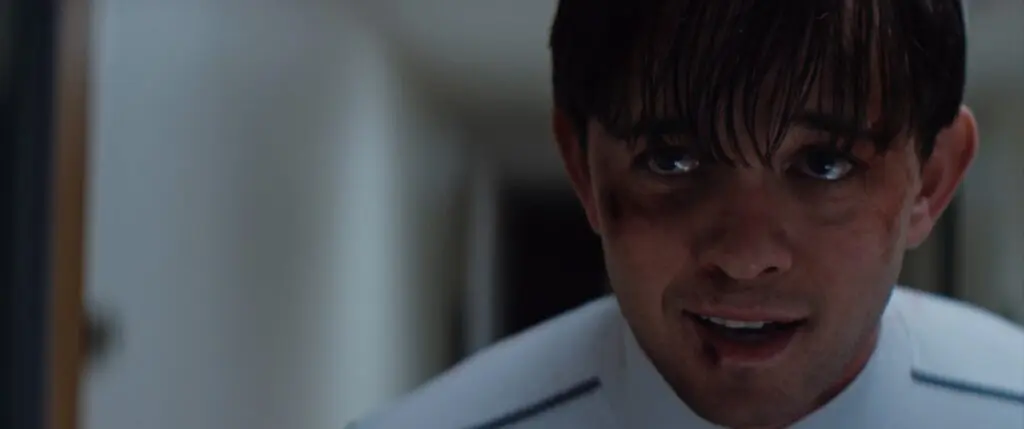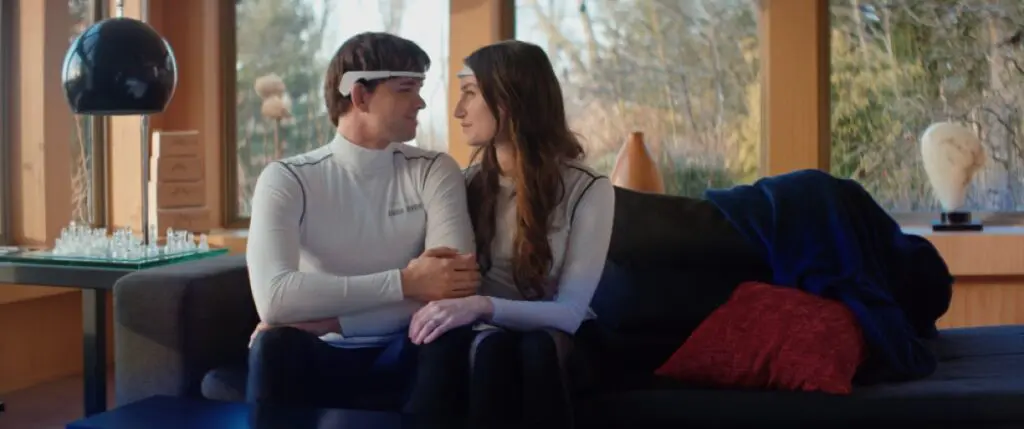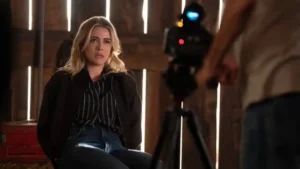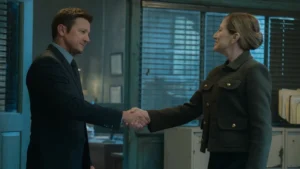Summary
A film in which couples are studied to understand why couples change. Does the central couple change, or did they simply not know each other as well as they thought? Intriguing film, though it doesn’t quite answer its own question, and neither is it clear about its key theme.
The Honeymoon Phase… where to begin? I could tell you about the story, the style, the themes, or what I think the filmmaker is “trying to say”. Most of these work, though unfortunately, they don’t all work together.
A honeymoon usually begins after a couple marries, though the couple at the center of this film, Tom (Jim Schubin) and Eve (Chloe Carroll), are not married but pretending. They answer an advert for married couples to participate in the Millennium Project: they will be observed in isolation in a spacious home for one month, fully catered, after which they will be eligible for a payout of fifty thousand dollars. Each couple is interviewed and vetted, and the project’s director (François Chau) tells them that he hopes to understand why romantic feelings wane with time. Tom and Eve enjoy the plush environment at first and feel close even though they know they are not strictly enjoying privacy. Very soon, though, Eve starts to notice (or thinks she notices) odd discrepancies in Tom’s behavior, but he doesn’t want to hear about her discomfort. Were they perhaps not ready to spend so much time together, or is the experiment itself a bad idea?
The Honeymoon Phase is a thriller, for sure, with sci-fi undertones (clear as soon as Tom and Eve arrive in their lodging and are given “orientation” by a hologram), subtle at first. The opening, in which Tom talks about his wife having committed suicide, tells viewers that the majority of the film will be in flashback; and when we see their elated holiday mood spoiled by a scared neighbor at the door, it feels almost like a Philip K Dick story adapted by Hitchcock. It’s easy to wonder what is going to go wrong for this seemingly perfect couple, and natural to assume Eve is becoming paranoid. I’ve seen My Little Eye and Vacancy: things don’t turn out well for people in films who are being watched.
Chloe Carroll is perfect as Eve: she is an everywoman with dreams, someone who adores her partner as well as her own autonomy. Apart from Tom’s brief monologues, most of the film presents Eve’s point of view, and although we can’t always rely on her interpretation of events, we get to know her pretty well. I wish she’d been given enough depth to be likable, though: intriguing though The Honeymoon Phase was, I wasn’t actually bothered what happened (it didn’t help that I knew from the start that Eve was going to die). Schubin’s Tom was a little like Colin Hanks: boyish on the surface, but can present something nasty with little notice. Like a younger version of Jack Torrance, Tom is frustrated with writer’s block and – probably – some cabin fever. His character is difficult to pin down, and although that was kind of the idea, it means I can’t actually tell you whether he’s a good guy or not.

But how can you know anyone is a good guy? Can you tell straight away? Writer and director Phillip G. Carroll Jr. is suggesting that we cannot know the people we are closest to completely; at least not until circumstances change when we might see a person in a different light. I must say, though, that I’m not comfortable with what I saw in the film any more than Eve was comfortable with what she saw in Tom. It seems to me that not knowing a partner terribly well is more of an issue in this story than the aggression and misogyny that Eve uncovered in Tom: the unpleasant way that Tom treated her – while under the guise of being married – was secondary to the fact that this was a new side Eve had uncovered in him.
Personally, I’m tired of misogyny being used as a device for drama these days, and I’m really not sure whether it belongs in the hands of a man. (How would people have responded to Get Out if it had been written or made by a white person?) On the other hand, it’s clear that something negative was going to emerge from the couple’s experience, and this is just as clearly a mood of the decade.
Moving on from that… The Honeymoon Phase is a beautifully made film; in a careful and simple way, not flashy or ambitious. There are many white, bright aspects to it (including the clothes and décor), making everything appear effortlessly well-to-do and polished. Consequently, I didn’t once feel that keeping most of the action in one location was simply a device to keep the costs down. The direction works well, taking us smoothly along Eve’s journey from a hard but contented life through comfortable discontent. Clichés are avoided, and there is hardly anything predictable about the film.
Overall, though, The Honeymoon Phase is a bit of a muddle, with too much unexplained. That neighbor at the door is never satisfactorily explained, neither is the weird pregnancy, nor even the ultimate purpose of the experiment itself. I couldn’t tell you whether the message of the film is that we never really know each other, that men are really sexist pigs underneath the surface, that “science experiments” shouldn’t be trusted; or whether there is simply no message at all, but it’s simply set in a sci-fi context to add a quirk to the narrative.
I enjoyed it a great deal for the first hour when the plot was keeping me on my toes. But like many a marriage, the shine wore off after a while.
The Honeymoon Phase will be available from August 21 in the USA courtesy of Dark Sky Films. This review was filed from FrightFest 2020. You can check our full coverage of the festival by clicking these words.




